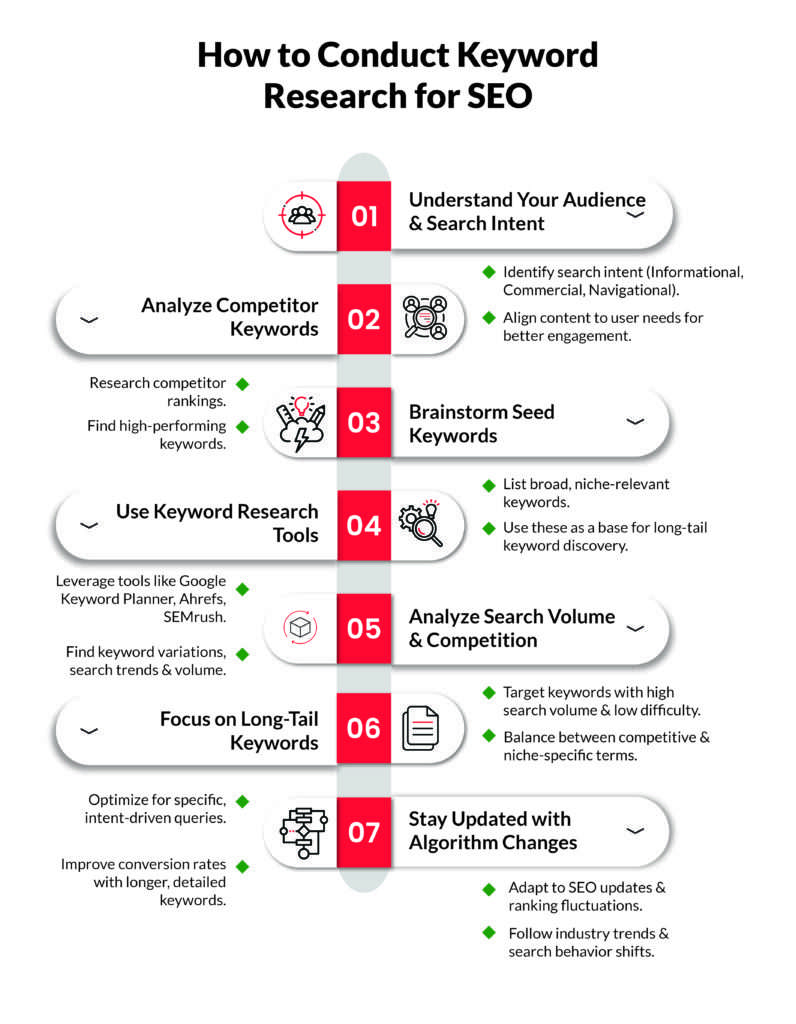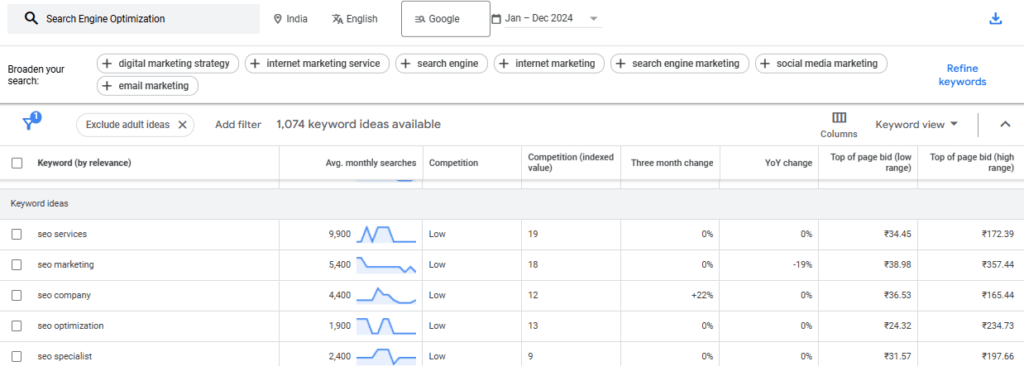The Ultimate Guide on How to Do Keyword Research for SEO – Opositive
Have you ever wondered how Google shows suggestions on every word we type in the search box? Of course, Google knows it all! It registers all the searches of the world and arranges them in an organised manner. In short, it knows the search keywords and phrases and it wants to answer even before you type the complete query. It is important to be aware of those keywords that relate to your business or blog, which can help you be visible to your audience. But how do you find those lead-winning keywords? Answer- keyword research.
Keyword research is the backbone of any successful SEO strategy. That is, it involves finding the particular words and phrases through which your target audience seeks information online. Mastering this fundamental skill can enhance your website’s visibility, attract greater organic traffic, and deliver business results. Here, we’re going to describe everything in depth, from how to do keyword research for SEO effectively.
What is Keyword Research?
Keyword research is the process of finding and analyzing terms that people use in search engines like Google to find information, products, or services. It helps you understand your audience’s language and search intent, so you can create an optimize content that directly addresses their needs.
For example, if a person is searching for “how to find the best keywords for SEO,” they most likely want to know a step-by-step process or be given a tool to recommend. That will help you to write the relevant content ranking high in the search results and attract the appropriate audience.
Role of Keyword Research in SEO
Keyword research will always be at the core of all your SEO activity. Keywords enable search engines to associate your content with the words that a user might be searching for. You will be able to improve your rankings, increase user engagement, and drive organic traffic to your site better when you target the right keyword.
Understanding the right way to do keyword SEO research will enable you to;
- Target the appropriate audience: the active seekers for what you’re offering.
- Boost relevance of your content: This makes it aligned to user intent so that your click-through rate gets a boost.
- Boost conversion rates: Drive good quality traffic more likely to become leads or even sales.
Why is Keyword Research Important in SEO?
Keyword research is crucial as it connects your website to the appropriate audience. If you don’t, the users looking for specific topics covered on your site won’t see it. Knowing how to find the best keywords for SEO helps optimize content for meeting the needs of the users and for the search engine’s requirements, hence yielding better rankings, organic traffic, and conversions.
Additionally, keyword research lets you:
- Discover New Ones: Fill gaps within your content strategy and take advantage of untapped niches.
- Understand Market Trends: Learn what interests your target audience.
- Optimize ROI: Include impactful keywords to really optimize return on investment.
How to Conduct Keyword Research for SEO: Step-by-Step Guide

Step 1: Understand Your Audience and Search Intent
It is about determining the target audience and knowing why they are searching. Search intent is the intention that a user has while making a query. There are four types in total, which are classified as follows:
- Informational: Users who are looking to know something or get an answer-for example, “how to do keyword research for SEO.”
- Navigational: Users searching for a specific website or page-for example, “Google Keyword Planner.”.
- Transactional: Users who have the intent to buy something (for example, “buy SEO tools online”).
- Commercial: Users compare options before choosing between two or more choices. For example, “best keyword research tools”.
Matching your keywords to these intents ensures that your content will always find the right audience.

Step 2: Analyze Competitors’ Keywords
Study your competitors to identify the keywords that they are targeting. You can do this using SEO tools Ahrefs, SEMrush, or SpyFu and analyze their competitors’ websites for their top ranking keywords. Apply this data for identifying gaps in your strategy that your competitors might not have addressed.
Step 3: Brainstorm Seed Keywords
Seed keywords are general terms about your industry, product, or service. For instance, if you run a fitness company, seed keywords could be “workout routines,” “gym equipment,” and “fat loss tips.” These words will give you a foundation on which you can build toward longer-tail terms.
Step 4: Keyword Research Tools
Keyword research tools are quite important to discover the best possible use of keywords in SEO. The leading tools are as follows:
- Google Keyword Planner: For simple keyword suggestions and approximate search volumes.
- Ahrefs and SEMrush: Keyword Difficulty, competitor research, and backlinks.
- Ubersuggest and Moz Keyword Explorer: Great for beginners. Keyword trend and performance metrics, etc.
Input your seed words into the tools above to get a list of relevant keywords.

Step 5: Anaylze Search Volume and Competition
Search volume means how often a keyword is searched. Competition indicates how difficult it is to rank for that term. Ideally, you’d like keywords with:
- High search volume To be sure of getting sufficient traffic.
- Low competition More likely to rank.
For example, you might narrow down to a long-tail keyword “shoe stores or shoe stores near me” and not the high-competition keyword “shoes”.

Step 6: Refine Long Tail Keyword
A long tail keyword is a very specific phrase. Generally, a long tail keyword has fewer competition but higher intent. For instance, “how to find keywords for SEO beginners”. It is going to target a very niche audience.
These are also invaluable to target closer to a point of decision or of action like ‘’how to do seo keyword research’’.
Step 7: Stay Updated with Algorithm Changes
SEO is a living thing. It perpetually evolves in its form, and search engines tend to continually update their algorithm, which leads to changes within keyword rankings. Learn about this and adjust keyword strategy for that reason alone; stay ahead for the sake of staying ahead of the curve.
How to Find Best Keywords for SEO: Tips and Techniques
If you are looking for tips and tricks on how to find best keywords for SEO, then use the following:
Discovering Relevant Keyword Ideas
- Brainstorm for keyword ideas
- Conduct surveys with customers
- Use community forums
- Use the Answer ThePublic tool to uncover questions and phrases your audience may be searching for
Use Seed Keywords
Seed keywords are the foundation for expanding your keyword list. Enter them into tools like SEMrush or Ubersuggest to find related terms and refine your strategy.
Identifying Existing Ranking Keywords
Use Google Search Console to identify the keywords your site is already ranking for. Enhance your content on these terms for better visibility.
How to Select Keywords for SEO?
Analyzing Search Intent
Identify if a keyword is related to informational, navigational, commercial, or transactional intent. For example, “how to do keyword research” is an informational intent, while “buy keyword research tools” is a transactional intent.
Keyword Difficulty Evaluation
Keyword difficulty is a measure of how hard it is for a term to rank. For quick wins, target low difficulty keywords with high search volume.
Keyword Research Mistakes to Avoid
Over Reliance on Broad Keywords
Broad keywords compete and rarely yield a specific crowd. Target specific action-oriented keywords with relevance to what your audience requires.
Ignoring User Intent
Content targeting keywords but not matching with intent will have high bounce rates. Remind, it is always important to look into matching your content to the expectations of the searcher.
Focusing only on Search Volume
Too much search volume doesn’t mean much success; rather, it’s more of a balance between relevance and intent along with competition for effective results.
Tools for Effective Keyword Research
Google Keyword Planner
Free tool with the following useful information: search volume, competition, and keyword suggestions.
Ahrefs and SEMrush
More advanced tools offering keyword difficulty analysis, competitor research, and backlink data.
Ubersuggest and Moz Keyword Explorer
Easy-to-use tools with keyword trends, performance metrics, and actionable insights.
Conclusion
It is one of the most important skills for success in SEO: learning how to do keyword research. Before you create a keyword strategy, you must first identify your audience, use the most powerful tools, and avoid common mistakes to drive organic traffic and increase visibility on your website. Start today to learn how to find keywords for SEO and have amazing results with these techniques. Consistent effort will help you learn how to conduct keyword research and take your online presence to new heights.







